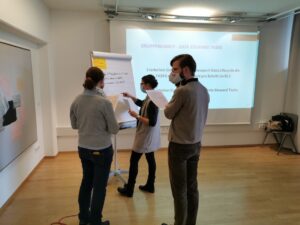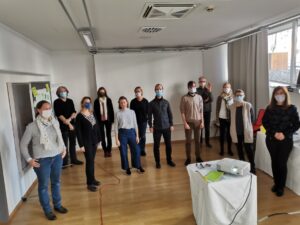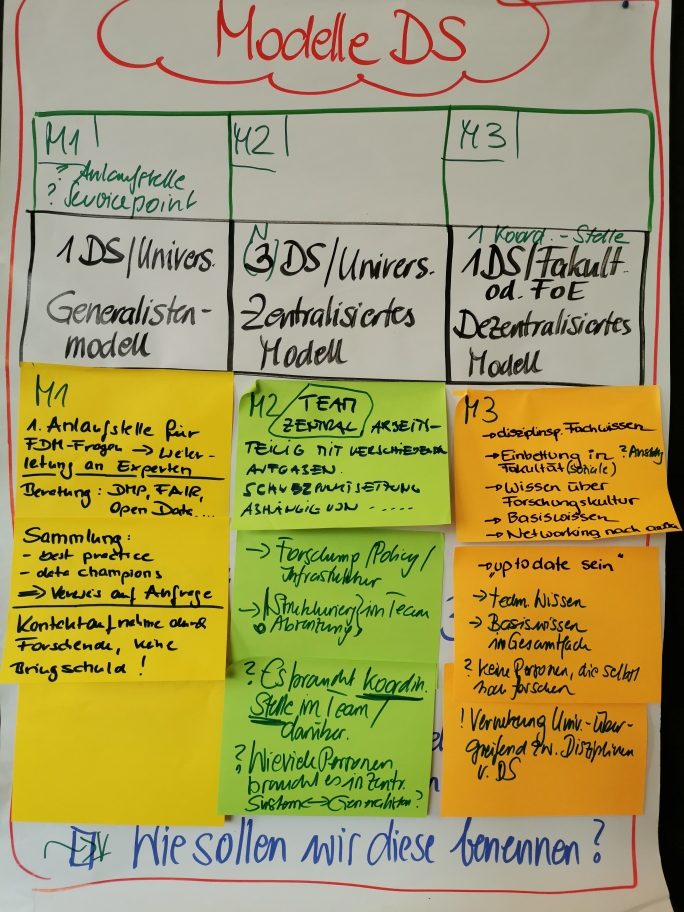Representatives from partner universities met in October for a joint workshop at TU Graz to define the profile of data stewards. Data stewards are experts in the field of research data management and bring their expertise to the organization. The role is being newly established at Austrian universities.
Key data
Date: 21 October 2020
Location: Augartenhotel, Graz
Time: 10-18:00
Participants: Ilire Hasani-Mavriqi (TU Graz), Sarah Stryeck (TU Graz), Tony Ross-Hellauer (TU Graz), Hermann Schranzhofer (TU Graz), Elisabeth Rieger (TU Graz), Stefan Reichmann (TU Graz), Susanne Blumesberger (Uni Wien), Barbara Sanchez (TU Wien), Christiane Stork (TU Wien), Eva-Maria Asamer (TU Wien), Peter Schaffer (MedUni Graz), Caroline Auer (MedUni Graz), Therese Macher (MedUni Graz)
Programme
10.00 – 10.15 Welcome & Vision Statement
10.15 – 10.30 Summary IST Analysis
10.30 – 11.00 Data Steward Landscape Studies
11.00 – 11.30 Introduction & Discussion – Data Steward-Models
11.30 – 11.50 Coffee Break
11.50 – 13.00 Introduction Research Data Lifecycle & Group Exercise – Tasks of a Data Steward
13.00 – 14.10 Lunch Break
14.10 – 15.15 Presentation and Combination of Group Results on Data Steward Tasks –
Group Exercise: Mapping of DS Models and Tasks
15.15 – 15.45 Coffee Break
15.45 – 16.45 Presentation, Discussion & Summary of the Group Exercise on DS Models
16.45 – 17.00 Air out the room
17.00-17.40 Round of reflections, Advantages/Disadvantages of the Models
17.40 -18.00 Final round of comments & Closing
Workshop Goals & Programme
Data stewards are the organisational counterpart of data management practices as they shoulder the bulk of data management-related consulting and supply their comprehensive knowledge to their organisation. Accordingly, developing the profile of a data steward constitutes an essential part of work package 5 within the FAIR Data Austria project. As task leader, TU Graz organised a workshop inviting all project partners to Graz on 21 October 2020. The face-to-face workshop took place at Augarten Hotel and was moderated by Elisabeth Rieger (TU Graz).
Representatives from the University of Vienna, the Vienna University of Technology and the Medical University of Graz attended in person. Two other project partners, the University of Innsbruck and the Academy of Fine Arts Vienna, made their contribution in advance due to the corona restrictions. The main workshop aim was to develop a common understanding of the role and tasks of a data steward across varying institutional contexts.
Workshop Overview
After a brief introduction to the topic by Tony Ross-Hellauer (a vision for data stewardship), Ilire Hasani-Mavriqi (international academic publications on the topic, introduction of 3 Data stewardship models) and Stefan Reichmann (presentation of a small survey of Austrian universities on data stewardship goals and current trajectories), participants were asked to form three groups, each dedicated to expanding on one of the three data stewardship models. The results were then taken to the plenary for discussion and further expansion. The entire workshop was guided by an exercise introduced at the beginning by Elisabeht Rieger where participants were asked to position themselves on a spectrum (symbolized through a rope laid out on the conference room floor) depending on where they thought their university stood in terms of data stewardship implementation. Throughout the workshop participants were asked to come back to the rope twice to visualize how their assessment had changed through our conceptual collaboration.

Group Exercise: What does Data Stewardship mean?
The interactive part of the workshop had our participants complete two different group exercises in various groups. The first task was about expanding one of the three models and presenting the results to the other participants with the aim of creating a toolbox for implementing data stewards in research-performing organizations. The three models up for discussion can be summarized as follows:
Model 1 (generic): One data steward per university
Model 2 (centralized): Up to three data stewards per university
Model 3 (decentralized): One data steward per faculty or Field of Expertise
Participants were asked to discuss the three models based on the following questions:
Do we agree with these models? Based on our experience, are these 3 models enough? Are we missing a model?
Do we wish to expand on these models in our toolbox?
What do we want to call these models?
Consensus was reached quickly among the participants that the three models sufficiently formalize the problem at hand and would therefore be part of a data stewardship toolbox but that the proposed names would have to be refined. Further, participants expected that the models would be realized to varying degrees and (sometimes) in varying combinations and degrees.
Based on the plenary discussion, model 1 characterizes data stewards as an interface for all issues surrounding RDM. Data stewards of this kind coordinate and forward RDM-related requests, offer generic consultation on RDM issues but do not perform operative data management for institutes. This model is close to a data servicepoint.
Model 2 describes lived data stewardship practices that can be found frequently these days and that developed out of institutional repositories and the expertise surrounding them. These are characterized by one more or less centralized organisational unit that bundles core RDM competencies and offers consultation. These competencies are broader than in model 1 because there are usually more people involved. This might be referred to as a Data Steward Office.
Model 3 envisions data stewards embedded at institutes, faculties or fields of expertise who should have demonstrated domain-specific knowledge and research experience and are hence able to offer domain-specific advice. Model 3 foresees central coordination of these embedded data stewards. However, the group was unable to clarify the extent to which embedded data stewards can or should be involved in research activities. The name that was suggested reads “Data Stewards Network”.
Data Stewards within the Data Lifecycle
The second group task was to expand on data stewards’ tasks based on the established model of the data lifecycle. Data management, the group agreed, concerns all concrete, operative tasks within a research project and is therefore the job of researchers to a large degree. By contrast, data stewardship refers to planning and consulting activities ahead of time.
Data stewards, then, have a consulting role throughout the entire data lifecycle, whether regarding Data Management Plans (DMPs), ahead of a research project to clarify data management needs, regarding questions of data preservation, archiving and dissemination, but also data reuse. Besides, data stewards fulfill an important function in that they provide an interface and communicate the needs of researchers to other organisational units (most notbaly the IT department). The group was unable to agree on how the tasks of a data steward differ from those of a data manager; besides domain-specific advice there is an organisational (coordinating) aspect to the work that was seen more with data managers rather than data stewards.
Next Steps
TU Graz is working on a report summarizing the workshop results that will be ready by mid-November, when it will be made available to all project partners for comments and suggestions. The finished report will be published as a project result and available to all interested parties.



